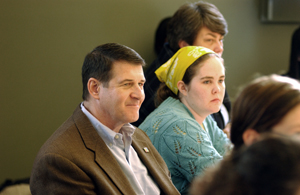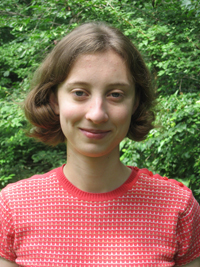Wellesley Professor Leads Seven-College Study
of Today's Students
Results will change the college experience now and in the future
FOR IMMEDIATE RELEASE:
Sept. 10, 2008 |
|
 |
| A STUDY OF STUDENTS: Professor of sociology Lee Cuba directs a study of the class of 2010, a project taking place at seven New England colleges, including Wellesley. |
WELLESLEY,
Mass. -- This fall, a group of 36 college juniors from seven New England colleges will once again have the power to make life better for thousands of students following in their footsteps.
Now entering its third year, or the halfway point in its trajectory, the New England Consortium on Assessment and Student Learning (NECASL) has been asking in-depth questions of members of the class of 2010 at seven New England colleges.
In personal interviews, they are being tracked as they make the transition from high school to college, through their first year of college, to their choice of a major, to the decision to study away or not — and eventually to postgraduate study or employment after college. The one-of-its-kind study, supported by grants from the Teagle, Mellon and Spencer foundations, is led by Wellesley College professor of sociology Lee Cuba.
The wide-ranging project aims to find out how:
- students make the transition from high school to college
- students make important academic decisions
- academic and social life varies over time
- college practices and policies affect student learning
“We have a window on students’ lives as they move through college,” Cuba said. “It’s not just a research project but also an assessment project. The results can have an effect on the programs we have right now.”
The students in the study, from each of seven participating colleges – Wellesley, Bates, Bowdoin, Colby, Middlebury, Smith and Trinity – are interviewed by student interns — an aspect of the project that makes it both effective and unique.
“Having students interview other students shows that they are in a real partnership in this,” Cuba said. “The interviewers have an insightful perspective on the college experience, and the interviewees are more likely to express themselves truthfully to their peers.”
 |
| QUESTIONS, QUESTIONS: Wellesley's Cristin Bates, a 2008 graduate, has participated in the NECASL project since its start. |
BY STUDENTS, FOR STUDENTS: One interviewer, Cristin Bates of Dudley, Mass., graduated from Wellesley College this year. As a first-year student at Wellesley, she took an introductory sociology course with Cuba, making such a good impression that he asked her to help conduct research with him. During her sophomore year, she took part in focus groups for the NECASL project.
“My job was to sit and take notes and write summaries,” Bates said. “The focus groups were a way of trying out the first set of interview questions we would use the following year. In my junior year, I was an interviewer, using the same set of questions.”
As she was finishing up her final year at Wellesley while continuing to work as a student interviewer, Bates began to contemplate life after college.
“As end of senior year was approaching, I didn’t know what I’d do after graduation,” she said. “Then Lee asked me if I’d be interested in continuing to work on the project. I thought that’s perfect. I can continue work I’ve enjoyed.”
This summer she has redesigned the study’s Web site while revising interview questions and coding software used to organize and analyze data. This fall she will coordinate the latest round of interviews with students, focusing on those who are studying away.
“We’re planning on using Skype, which is like a telephone over the Internet, to be in touch with them,” she explained. She also plans on visiting the other colleges involved in the project to see what they’ve learned and what changes they have made as a result.
“The part that I’ve liked is that it’s been so varied, and I’ve seen the project from its beginning stages,” Bates said. “Now I’m doing more work that’s behind the scenes. As I’ve grown at Wellesley, so has the project. I’ve really enjoyed the interviews, seeing people respond and open themselves up to you. Talking to students was fun because as they spoke about their experiences, it led me to reflect on my own experiences.”
BREAKING IT DOWN: For the project, students have been selected using a “quota sample,” allowing results to be broken down by gender and race. Of the 36 students from each school, there are six each of Asian-American, African-American, Latino and international students as well as 12 white students from the United States. In the schools that are coeducational, the subjects are divided equally by gender.
“We overrepresented students of color, who have not been studied as much, to see how their experiences compare with other groups,” Cuba said.
Cuba and his colleagues are not waiting until the study ends to reveal findings and suggest changes in the college experience. Already three colleges, including Wellesley, have improved their advising system based on feedback from these students.
While first-year students are randomly assigned a faculty member to guide them until they choose a major, the study found that such guidance is more helpful when it is broad and deep in its approach.
“What was really helpful was someone who would open up a conversation with entering students rather than focus on what courses they should take,” Cuba said. “That’s a better approach because course selection advice isn’t that salient to students at this point in their college careers.”
The new system at Wellesley now emphasizes a more deliberate assignment of advisor to student, encouraging more mentoring and reflection than before. Similar improvements have been made at other NECASL schools.
This year, as the students enter their junior year, the questions will revolve around the study away experience, comparing the experiences of those who choose to study away with those who don’t, and the coursework in their major field. Next year, the emphasis will be on the success and value of senior projects and on post-graduation plans. The last and final year of the project will take place after the students have graduated, focusing on how well they feel college prepared them for their current roles as employees, volunteers or graduate students.
LOOKING FORWARD AND BACKWARD: As a bonus to the project, the interview process seems to help students focus on the future. The question “What would make this a successful year for you?” invites students to look ahead. At year’s end, they are asked to talk about how things went.
Both are valuable exercises, according to Cuba, “because it gets students to articulate their expectations and to reflect back. We are asking, ‘This is what you wanted; did it happen?’”
Such reflection stands to change their whole college experience, increasing students’ level of engagement in their education.
“They are not just going along but are strongly involved and caught up in the experience,” Cuba said.
Parallel responses from students at all seven colleges have also been key, Cuba said.
“There was a marked, overwhelming similarity among the group of schools, suggesting that a lot of what we have to say is applicable to many other colleges,” he said.
By talking to students as they make their way through their college years, Cuba and his colleagues hope to create a more successful educational experience. Like pioneers leaving markers on a trail, the class of 2010 will make it easier for others following behind to enjoy a successful journey.
Since 1875, Wellesley College has been a leader in providing an excellent liberal arts education for women who will make a difference in the world. Its 500-acre campus near Boston is home to 2,300 undergraduate students from all 50 states and 68 countries.
###
|

